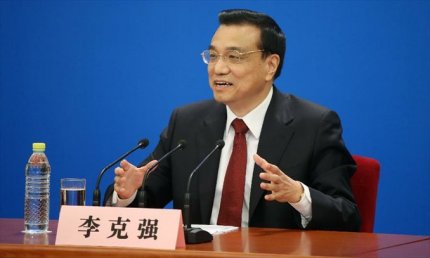This week Chinese Premier Li Keqiang gave his annual “press conference” to cap off the National People’s Congress.
I put “press conference” in quotations because it’s hardly anything of the sort. Journalists must submit questions for Li well in advance and then negotiate with press handlers on the precise wording of how the question will be delivered. This year there were reportedly a few topics like Zhou Yongkang and the Kunming knife attack that were totally out of bounds and would result in a “blacklisting” if mentioned.
This has been going on for a long time and last year several reporters started getting fed up with it. At the Foreign Correspondent’s Club of China annual meeting last year, no topic was debated more vocally than how to respond to this issue. So I was hoping we’d see few, if any, foreign (and ideally, Chinese) reporters show up to the charade this year. But if they had to attend (after all, bombshells have been dropped there before), I hoped at the very least no foreign reporters would legitimize the farce by reciting pre-approved softballs for Li to bunt. Unfortunately, my naïve hopes went unfulfilled and an unprecedented nine foreign/non-mainland reporters were called on.
In 2012, Australian “reporter” Andrea Yu was called on repeatedly to lob disappointing softballs at officials, and it was later discovered she was being fed her questions by the Beijing-controlled media outlet she worked for (and it seems the same organization is still sending similar shills this year). After that episode, real foreign journalists were understandably miffed. But when you think about it, what she did isn’t much worse than being complicit in the way Li Keqiang’s press conference works.
Li gets to leaf through hundreds of questions and pick exactly what he wants to answer, has compliant foreigners recite their lines, and then scores big points with viewers for being bold enough to face presumably more critical reporters. This is a major point of pride for CCP leaders (former President Jiang Zemin once boasted to Hong Kong reporters about how he’d taken on Mike Wallace and Barbara Walters).
The questions that are chosen are either completely benign or just barely edgy enough to seem “sensitive” (ie – relating to corruption, pollution or hacking). At best, Chinese viewers understand what’s going on and it makes the international press corps look like hapless wusses anxious to devour any meatless bone the Chinese leadership deigns to toss them. Famous Hong Kong reporter Luqiu Luwei wrote an op-ed in Financial Times saying that “the Best Actor Award” this year must go to the foreign media.
But at worst, Chinese viewers don’t understand what’s going on and think it’s a legitimate press conference. In that case, the compliant journalists are actively helping Chinese leaders gloss over actual tough issues that viewers should be aware of.
Casual Chinese observers who catch the CCTV press conference might not ever bother scaling the Great Firewall to see what’s really going on, but they expect foreign reporters to ask tough questions. They’ve had it hammered into their heads that foreign journalists are out to smear China’s leaders and cause the country’s collapse. But when the toughest question they see is some abstract mention of debt risks, they might mistakenly get the impression that these are China’s most pressing issues. But in fact, there was no mention of Tibetan immolations, the foreign journalists who’ve been expelled, the tightening grip on domestic media, Document 9, the extra-judicial imprisonment of people like Liu Xia (Liu Xiaobo’s wife) who haven’t even been found guilty of any crime, the enormous wealth of NPC members and potential conflicts of interest, the stalling of official assets declaration (and prosecution of those who’ve loudly called for it), dissatisfaction with the political situation in Hong Kong, prostitution crackdowns that leave already vulnerable young women with even greater exposure to exploitation and violence, or the offshore holdings by the families of powerful leaders. I could go on… That none of these things were mentioned raised some serious eyebrows from foreign and domestic observers alike.
Several of the foreign reporters who were called on to ask questions are among the best in Beijing, and I have the utmost respect for them…but I think they made a bad call here. I understand that this practice also happens in many Western countries, but that doesn’t make it right there either.
I wouldn’t expect anyone to go back on their word and ask an unapproved question, but it wouldn’t be such a bad thing to refuse participation in the performance…or just skip the presser altogether, as many reporters opted to do.
As Luqiu Luwei put it: “The good thing is that foreign media finally experienced the Chinese media’s situation. Under the same pressure they had the same choice. From an ethical perspective, the choice they made deprived them of any right to be proud. Only media that didn’t attend the press conference can still talk about sticking to journalistic ideals.”

こんにちは、ニートポスト。 あなたと一緒に | 問題問題 | があるありますに ウェブエクスプローラ、かもしれないこの| テストをチェック? IEはまだのセクション| | | リーダーと大のの要素 人々の|素晴らしい| |素晴らしい|壮大な|に起因する優れた}の書き込みあなたの偉大上を通過 {出たままになります。
カバン 中古 国内即発 http://wmqnm.com